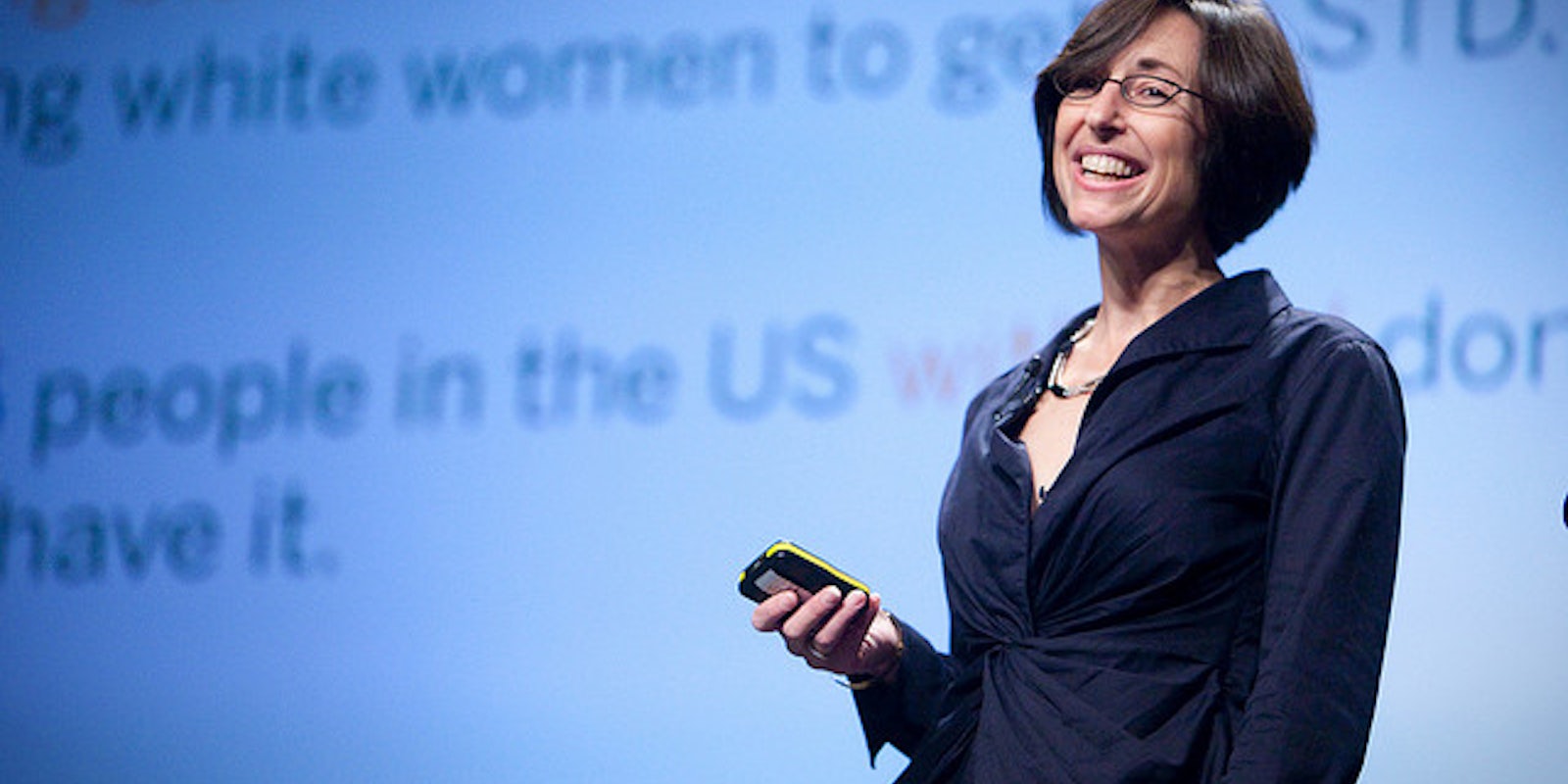Deb Levine was exploring the intersection between sexual health and technology back when most of us thought computers were just heavy calculators that could beat Russians at chess. In the early 90’s, as a health educator at Columbia University, she helped develop GoAskAlice, the first digital health question and answer service, which ran on Columbia’s Intranet (this was before the days of Netscape. We’re talking Web 0.0 here).
Today, in 2012, Levine is still at the forefront of the sexual health and technology field—only now her technological arsenal has expanded to include mobile apps, SMS, and social networks. Last year, the organization she founded, ISIS (Internet Sexuality Information Services), was honored by the White House for building a mobile app called “Circle of 6” which lets users quickly alert their friends via SMS if they find themselves in a potentially dangerous scenario. And just last week, ISIS wrapped up its fifth annual Sex::Tech conference, which turned out to be its biggest yet.
But as the power and reach of digital tools increases, so does the potential for both psychological harm and erosion of privacy. It’s this delicate balancing act to which Levine and her colleagues have devoted much of their attention.
“The computer screen really affords a perceived anonymity and a perceived confidentiality that allows people to say what people might not say to each other face-to-face,” Levine said. Or, put another way, Levine said it’s like a bridge between “sensitive questions and accurate information.”
The notion of young people talking openly about sex on the Web may bring to mind horrific examples of cyber-bullying and online sexual intimidation that dominate headlines. That said, the openness of the Internet also lets young people talk more frankly about sexual harassment and abuse than in a traditional classroom, Levine said. The question is, how do public health workers and technologists leverage that openness to positive ends?
That was the driving-force behind many of the proposals that came out of this year’s first-ever Sex::Tech hackathon, including one for a mobile platform called “Life Sense,” which allows young people to anonymously post diary-like entries about their sexual experiences.
“(Users) privately add information like ‘It’s Saturday night and I don’t have a date. I ended up hooking up with someone and I don’t feel so great.’ It’s about being able to keep that information private in the moment, but also being able to get back information about what other young people are doing as well. So it’s sort of a combination of normalizing your experience and also providing tips and advice for how to avoid that situation the next time.”
Of course young people are already using existing networks like Facebook and Twitter to share sexual experiences. Earlier this week, #ILostMyVirginityTo was trending nationwide. And last week we reported on the work of Dr. Peter Leone who found that patients were using Facebook to inform their sexual partners that they had contracted a sexually-transmitted disease.
But there are the obvious downsides to bringing frank sexual discussions before the prying eyes of the Internet. Cyber-bullying and other acts of humiliation were two of the issues addressed by the South Bronx youth group, Latino Youth in Action, at this year’s Sex::Tech conference.
“While (online social networks) have the potential to facilitate healthy friendships and social support networks among youth, there are growing concerns among Internet safety advocates about youth behaviors and victimization online,” said Ana Ventuneac, who helped present the findings and is a research scientist at Hunter College’s Center for HIV Educational Studies and Training in New York City.
One of the more surprising findings, said Ventuneac, was the rise of so-called “smut pages.” Smut pages are fake Facebook profiles set up anonymously under the names of classmates or acquaintances for the purpose of humiliating that individual. The owner of the Facebook page may post real photos or videos of the victim in sexually compromising positions or the content could be invented out-of-thin-air. The practice is disturbingly reminiscent of the pornographic site, “Is Anyone Up” which features pictures of nude or partially-nude women and men posted alongside screenshots of their Facebook profile. The site has attracted widespread criticism from defenders of both privacy and general human decency.
Levine said one of the keys to ensuring privacy online is to build anonymous platforms designed for information that is too sensitive for public networks like Facebook. It’s also important for non-profits to understand the privacy issues that arise from using third party platforms. For example, when a person joins or posts on one of ISIS’s Facebook pages, ISIS will respect the privacy of the information and content exchanged on that platform. But that doesn’t necessarily mean Facebook will.
“Third parties are collecting huge amounts of data,” Levine said. “In general, they’re not doing anything harmful with it. But the reality is, they’re collecting that and it’s unclear about what might happen in the future. So we can be thoughtful when we’re building.”
Levine said for significant steps to make in the field of youth health, it’s going to take a larger commitment from bigger tech companies.
“Let’s see a company like Instagram say, ‘How can we work on pictures of sexually-transmitted diseases? How can we take these photos and make them accessible so people can begin to self-diagnose?’”
OK, the world might not be quite ready for an Instagram STD filter. But as more and more power becomes centralized with huge tech companies, it’s a relief to know there are people like Levine working to keep these businesses accountable when it comes to public health concerns.
Photo by Kris Krug


